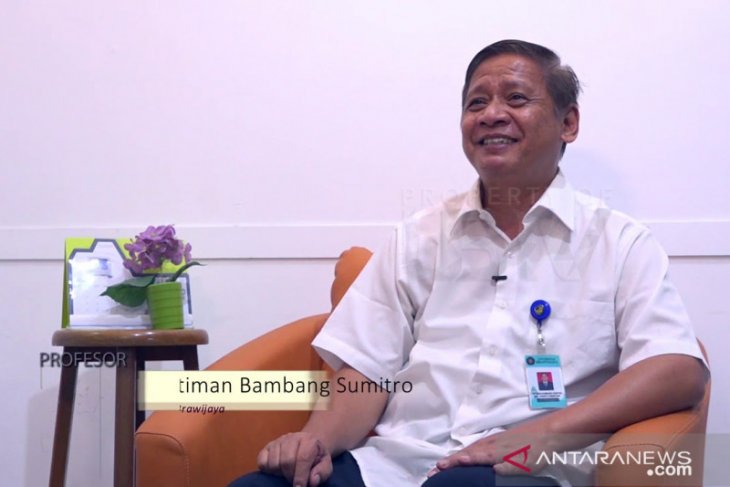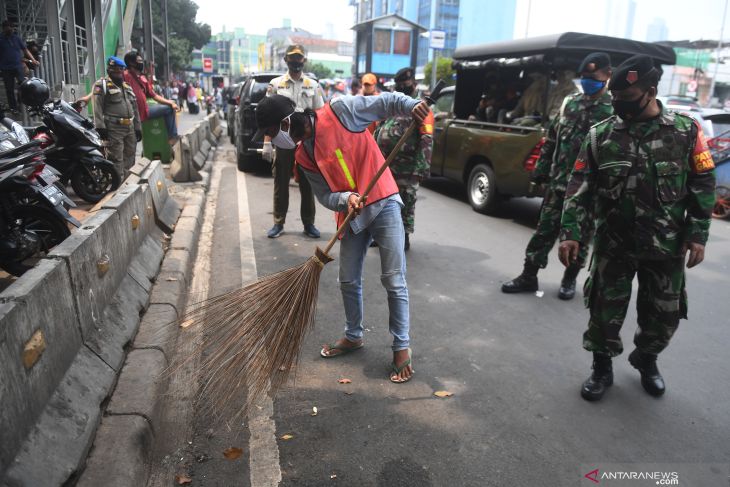Live Streaming
Program Highlight
Company Profile
May
Difficult to Make Vaccine due to COVID-19 Mutation: Biologist
Written by Ani Hasanah
Professor of Cell Biology at Brawijaya University in Malang, East Java, Sutiman (ANTARA/HO/UNIVERSITAS BRAWIJAYA/End)
A professor of cell biology at Malang-based Brawijaya University has said the tendency of thecoronavirus to mutate into local virus as that has made it difficult for researchers to develop a universal vaccine.
"The coronavirus has spread all over the world, and has mutated into local virus. As if it has shown an anti-globalization movement," Professor Sutiman said in Malang, East Java Province, on Wednesday while commenting on researchers' efforts to develop a COVID-19 vaccine.
This behavior of COVID-19 has made researchers uneasy as they try to develop a single vaccine that is fit for all people, irrespective of location, he said, adding that this has even become a hurdle for the medical industry’s current school of thought on developing vaccines or medicines.
In this regard, Sutiman said, the argument supporting the consumption of "jamu" (traditional herbal drink) is not aimed at curing specific diseases. Instead, it is aimed at maintaining the quality of life so that the benefits of "jamu" could potentially help tackle COVID-19, he added.
Traditionally, consuming “jamu” is believed to help the human body to survive and ward off disease, he explained. Amid the pandemic, “jamu”, a product of local wisdom, often rejected by modern medicine, has become well-known.
Another challenging reality related to the coronavirus pandemic is the fact that there are people who are asymptomatic (OTGs), that is, they do not present any COVID-19 symptoms, Sutiman said.
He said he believes that a majority of the people can be categorized as OTGs. They look healthy so they are able to perform routine activities, but they can potentially transmit the disease to other people, he noted.
Indonesia has been battling the spread of the new coronavirus disease (COVID-19) over the past three months. The Indonesian Government officially announced the country's first two confirmed COVID-19 cases on March 2 this year.
The initial outbreak of the deadly virus was reported in Wuhan at the end of December, 2019. China has been blamed for its lack of transparency and goodwill to tell the truth from the beginning that the virus could transmit among humans, due to which COVID-19 spread across the world.
The US, which has seen a large number of COVID-19 deaths, has accused China of having "intentionally concealed the severity of the coronavirus from the international community" (CNN, May 4, 2020).
Washington argued that "China likely cut its exports of medical supplies prior to its January WHO (World Health Organization) notification that COVID-19 is a contagion", according to a Department of Homeland Security report that CNN quoted on May 4, 2020.
Several developed countries, such as the United States of America, the United Kingdom, and Australia are working on developing a vaccine for COVID-19, but none of them has so far made any breakthrough. (ANTARA)
Foreign Minister Confirms 99,543 abroad-returned Indonesians over Pandemic
Written by Ani HasanahA total of 99,543 Indonesians have returned home from abroad as of May 19, 2020, in the wake of the COVID-19 pandemic, according to Foreign Minister Retno Marsudi.
"I want to update the number of Indonesians, who have returned to the country. As of yesterday (May 19), their number had reached 99,543 or rose by 4,441 from that a week ago," the minister stated during a video press conference in Jakarta on Wednesday.
Most Indonesians returned from Malaysia and were working for cruise ships, she remarked.
Since March 18, 2020, a total of 76,770 Indonesians have returned from Malaysia, rising by 1,926 as compared to a week ago.
In the meantime, 16,974 Indonesians employed as crew members of cruise liners have returned from 23 countries. The figure also increased by 1,154 as compared to the past week.
The number of returning Indonesians apart from those employed in Malaysia and as crew members of foreign cruise liners reached 5,790, including 182, who have recently arrived in Jakarta from Pakistan on Tuesday (May 19), he remarked.
Owing to the COVID-19 pandemic, several Indonesian migrant workers, especially those employed in the informal sector in Malaysia, have lost their jobs.
In the wake of the COVID-19 pandemic, President Joko Widodo (Jokowi) has instructed ministries to take precautionary measures for the return of 34 thousand Indonesian migrant workers, whose work contract will end in the months of May and June this year.
"Precautionary measures must be taken against this, and adequate preparations must be made. We should handle their arrivals through certain entry gates and monitor their movements to their hometowns," Jokowi stated during a videoconference on the acceleration of COVID-19 handling at the Merdeka Palace here on Monday. (ANTARA)
May
Baswedan Expects "New Normal" in Jakarta Following PSBB Third Round
Written by Ani HasanahA resident found violating large-scale social restrictions in Jakarta was ordered to clean the street in Tanah Abang, Central Jakarta, as Public Security Agency (Satpol PP) looks on.
Governor of Jakarta Anies Bawesdan projects normalcy to be restored in the capital and local residents resuming activities after the third round of large-scale social restrictions (PSBB) ends.
"If we all remain disciplined, Jakarta can return to a new normal. Many people usually call it a new normal to refer to a new situation instead of a pre-pandemic situation," he remarked at the Jakarta City Hall on Tuesday.
However, if in the subsequent two weeks, all residents infer that the PSBB is over and they can amass or congregate, then the transmission of COVID-19 will potentially increase, he cautioned.
"Remember that we were once in figure four (meaning one person transmits the disease to four other people) in March. We do not want to return to that position. We want to maintain the current position that is expected to improve further," he noted.
In the past couple of months since the imposition of PSBB, Jakarta residents can work together to control the spread of coronavirus, he remarked, adding that Jakarta’s residents are expected to not reduce their adherence to a disciplined lifestyle.
"This is not yet over. I want to underscore that there is no relaxation. Do not think it is relaxed. Do not feel that it is over," he stated.
"Neither should you embark on mudik (idul Fitri exodus). Please stay in Jakarta. We must ensure that our capital will really be able to contain the spread of COVID-19, " he added. (ANTARA)
Air India Repatriation Flight Carrying 59 Indonesians Lands in Jakarta
Written by Ani HasanahSome 59 Indonesian citizens impacted by the Indian government's lockdown policy to fight the transmission of the new coronavirus disease (COVID-19) have flown back to Jakarta from the Indira Gandhi International Airport on Wednesday morning.
The 59 Indonesians were repatriated aboard an Air India flight AI 13081 that took off from the Indira Gandhi International Airport at 6:31 a.m. local time and was scheduled to arrive at the Soekarno-Hatta International Airport at 2:45 p.m. local time.
Apart from the 59 Indonesians, comprising 38 tourists, 10 students, three badminton players, and seven professionals, the aircraft also flew 13 Indian citizens and a Russian national, the Indonesian Embassy in New Delhi noted in a press statement on Wednesday.
The same aircraft will carry several Indian citizens in Jakarta to their country of origin, the Indonesian embassy noted, adding that this repatriation was testament to the Indonesian government's commitment to protecting its citizens abroad.
"Offering protection to all Indonesian citizens abroad has become a priority in our diplomacy, especially in the time of crisis," Indonesian Ambassador to India Arto Suryodipuro was quoted as saying.
Before boarding the Air India flight, the Indonesian embassy's task force personnel briefed them on the healthcare protocols that they should follow, including wearing hazmat suits and face masks, during the flight and until their arrival.
The task force personnel also equipped them with several travel documents, including notifications corroborating their good health and not exhibiting symptoms of COVID-19 and eligible for boarding the aircraft, according to the Indonesian embassy.
Coronavirus infections initially emerged in the Chinese city of Wuhan at the end of 2019. Since then, COVID-19 has spread to at least 213 countries and territories, including India and Indonesia, with a massive hike in death toll.
The Indonesian Government officially confirmed the country's first cases on March 2 this year.
To contain the spread of the coronavirus disease, the government has enforced large-scale social restrictions and distancing measures in several cities, including Jakarta, Bogor, Bekasi, Surabaya, and Makassar. (ANTARA)





